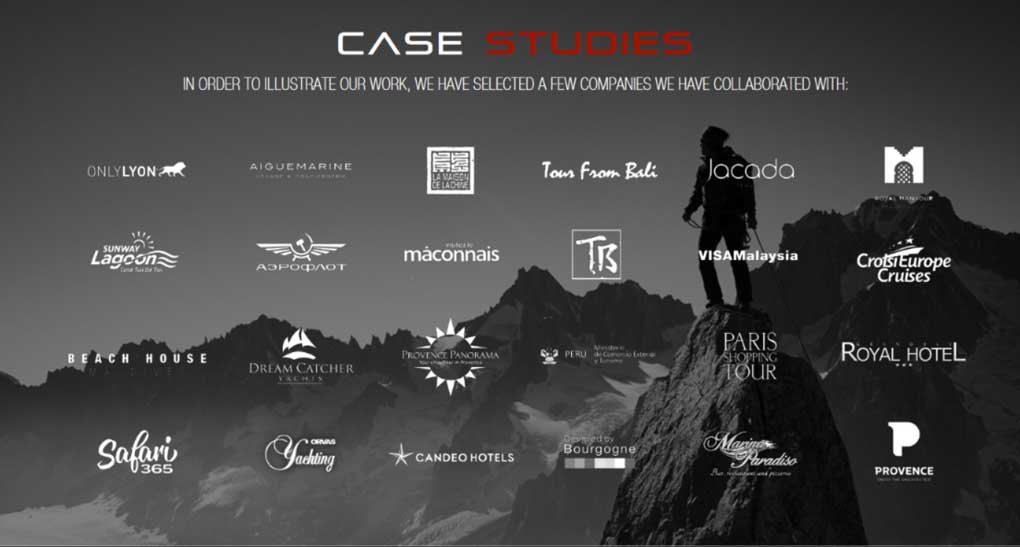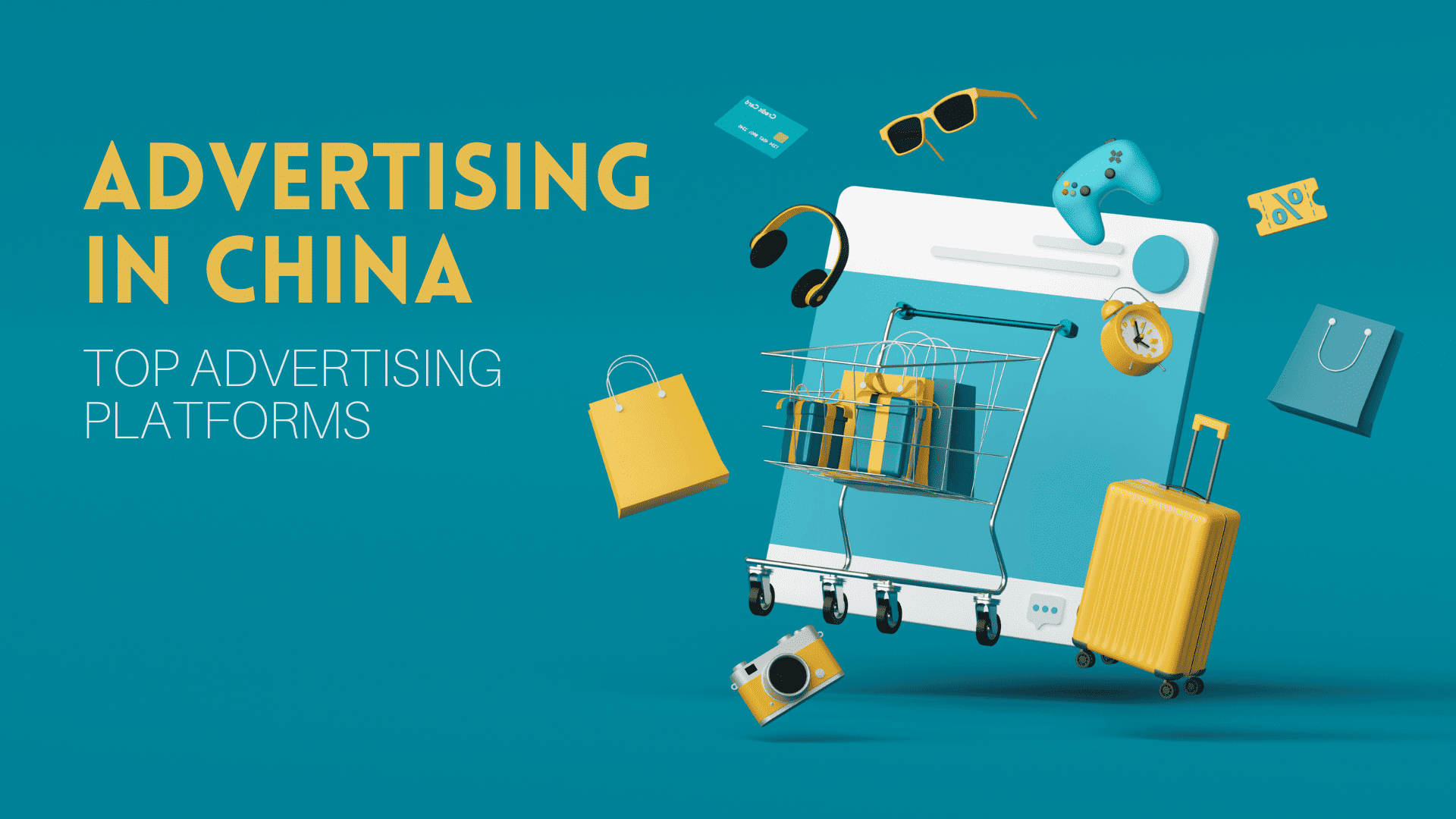Advertising in China: Best Strategies for the Tourism Industry
Are you struggling to reach Chinese tourists with your advertising efforts? We know the feeling. It can be frustrating trying to navigate the complexities of advertising in China’s unique market. But fear not! We’ve done extensive research and uncovered the best strategies for success.
In this article, we’ll share practical tips and insights to help you effectively advertise your tourism business in China. Get ready to unlock the secrets of reaching a whole new audience and watch your bookings soar!
Key Takeaways
- Understanding the diverse demographic of Chinese tourists is crucial for effective advertising in the Chinese advertising market. Tailor your marketing strategies to align with their preferences and travel behaviors.
- Online platforms like WeChat, Weibo, and Baidu play a significant role in influencing Chinese tourists’ travel decisions. Utilize social media marketing strategies and collaborate with influencers to reach this tech-savvy audience.
- WeChat offers various advertising opportunities such as Moments ads, official accounts, and mini-programs. Take advantage of these features to promote your tourism offerings and engage with potential customers.
- Weibo is the largest microblogging site in China and provides display ads and promoted posts for targeted advertising. Leverage its expansive user base to increase brand visibility and drive engagement.
- Baidu is the dominant search engine in China, making it essential for search engine marketing. Consider using options like Baidu Tuiguang (paid search results) to boost online visibility and attract relevant traffic.
Overview of the Chinese tourism market
Gone are the days when group packaged tours ruled the roost; the contemporary Chinese traveler craves unique experiences tailored to their tastes. China, currently standing tall as the world’s largest domestic tourist market and number one international consumer of tourism, plays host to an array of travel opportunities ranging from historical sightseeing and rural adventures to urban exploration and high-end luxury retreats.
The potential is massive – not just for those offering unique travel destinations but equally so for marketers who can capture this ever-changing appetite accurately.
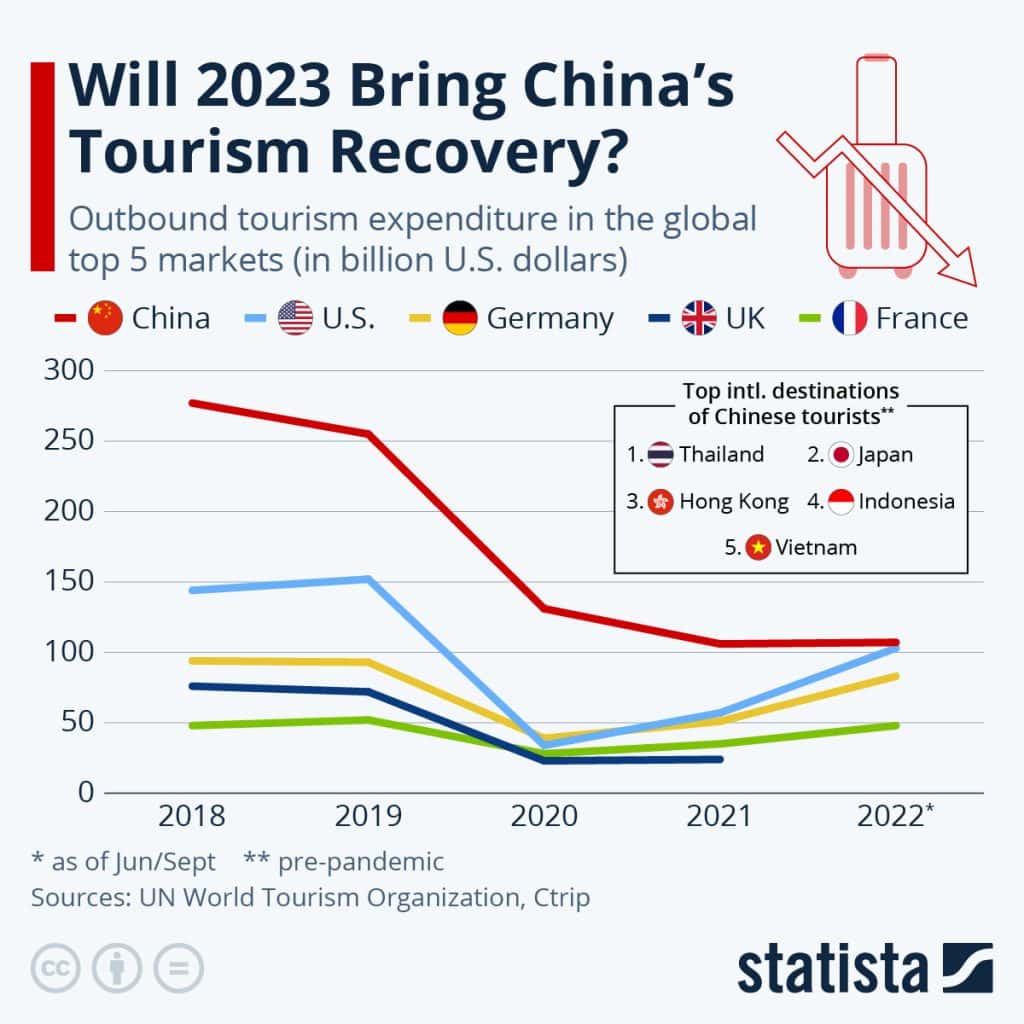
Fueling this change engine even further are technological advances that have increased information accessibility like never before — In short, there’s a whole world out there seducing Chinese travelers on one hand while on other global marketers vie for their attention with carefully curated advertising content hoping they choose their locale next time they pack up suitcases.
Chinese tourists are back, and it’s right about time to start attracting them through well-crafted advertising!
Who are the New Chinese Tourists?
Chinese tourists, with their unique consumer behavior and reliance on technology, present a lucrative market for the tourism industry in China. Discover key insights into their demographics, travel decisions influenced by social media, and how to effectively reach them.
Overview of the Chinese tourist demographic
This demographic spans various age groups and income levels, shaping a broad spectrum of interests and preferences.
For instance, most Chinese travelers show a preference for group tours that are pre-packaged for convenience – an insight crucial to tailoring your tourism offers effectively. Interestingly, statistics indicate that about 70 percent of these tourists prefer traveling with their family or friends.
Also noteworthy is the recent surge in domestic tourism within China itself highlighting local explorations as another appealing factor for this audience segment. It’s not a surprise, having in mind that China was closed for almost 3 years due to the COVID-19 pandemic. Yet, it’s important to keep in mind when preparing an advertising strategy.
Consumer behavior of Chinese tourists
Understanding the consumer behavior of Chinese tourists is a critical factor for successful advertising strategies in the tourism industry. Take note of their preference for online travel information; it’s integral to their decision-making process.
A key insight – they frequently perceive American products as having consistent quality but at lower prices compared to back home, making U.S destinations more appealing. Shopping habits can vary significantly between genders, so tailor your approach accordingly.
Besides shopping and sightseeing experiences, Chinese tourists place heavy emphasis on well-being during their travels, which has its roots deep within rising incomes and an increased interest in psychological health.
They are also known to highly favor duty-free shopping, adding another valuable touchpoint for businesses aiming to tap into this market effectively. The influence of Chinese cultural values cannot be underestimated either; it plays a significant role in shaping tourist behavior and demands while traveling abroad.

But it’s important to mention, that Chinese tourists in 2023 are different from those ones visiting the West in 2019 and before. They are more sophisticated and prefer customized experiences in smaller groups, specifically tailored to their needs. They are also changing their focus from shopping to outdoor activities and unique attractions, something that foreign companies need to take into consideration in the new post-covid reality.
The role of technology and social media in their travel decisions
Social media usage plays a significant role in influencing Chinese tourists’ choices and planning process. Chinese travelers heavily rely on platforms like WeChat, Weibo, Baidu, Douyin (TikTok), and Xiaohongshu (Little Red Book) when researching destinations and gathering information.
They value word-of-mouth recommendations received through these platforms and are open to using technology to enhance their travel experiences. By utilizing social media marketing strategies and engaging with influencers, your business can effectively reach and engage with this tech-savvy audience, ultimately attracting more Chinese tourists to your destination or service.

Best Channels for Advertising
WeChat is a popular platform for advertising in China, with various opportunities such as Moments ads, official accounts, and mini-programs. But apart from the obvious one, excluding traditional advertising options that are not really a thing anymore, there are other digital advertising options in Mainland China. Keep reading to discover the best solutions for your company.
WeChat, developed by Tencent, is the dominant app in China’s digital landscape, making it an essential platform for advertising in the country’s tourism industry. With over 1.2 billion monthly active users, WeChat offers a massive audience for businesses to target their marketing campaigns.
One of the key advertising options on WeChat is Moments ads. These ads allow brands to showcase their products or services to users as they browse through their Moments feed. This provides excellent visibility and reach for your advertising campaigns.
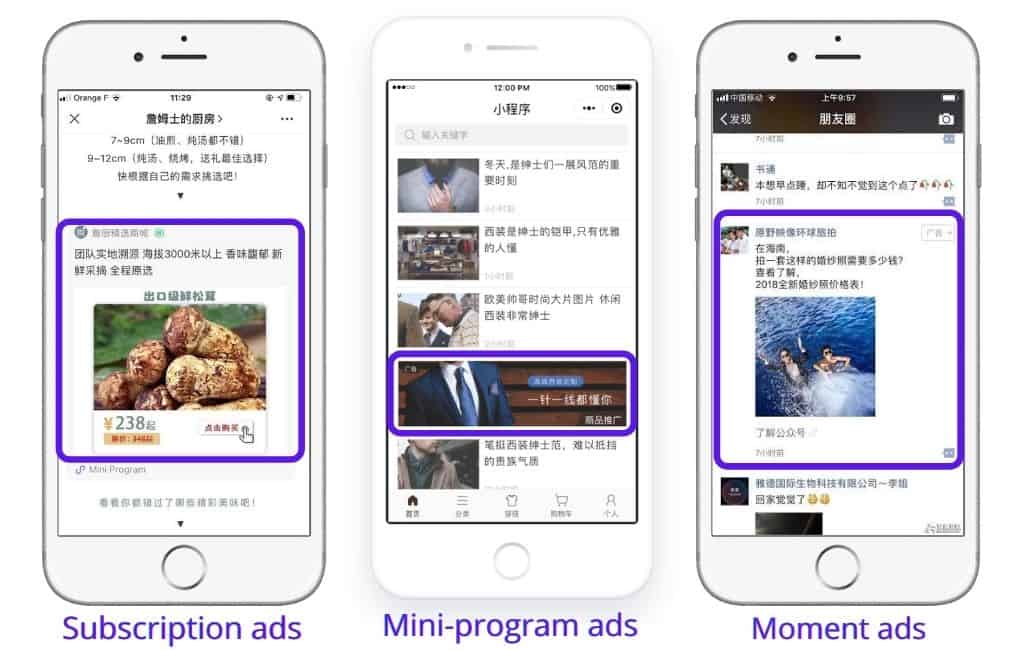
Additionally, official accounts on WeChat are another valuable tool for engaging with users through content marketing. By providing useful and relevant content through your service or subscription account, you can establish brand awareness and loyalty among potential customers.
Banner advertising on WeChat official account articles is also an effective tool and less expensive than Moment ads, yet the reach is not as impressive.
Another exciting opportunity on WeChat is mini-programs. These compact applications within the app offer various functionalities such as e-commerce or ticket booking. For companies in the tourism industry, this opens up opportunities to advertise their services directly through mobile advertising to potential customers who are already using WeChat regularly.

Weibo is the largest microblogging site and the most popular social media platform in China.
It offers a wide array of advertising formats, including display ads and promoted posts. Display ads on Weibo are strategically placed on search pages, homepages, and within users’ news feeds.
These ads can help increase brand visibility and drive user engagement. Promoted posts are another effective advertising format on Weibo, allowing brands to share paid content with their existing followers.
Apart from those, there are many other formats, like fan tunnels, fan headlines, destination page ads etc. The choice depends on your budget and target audience.
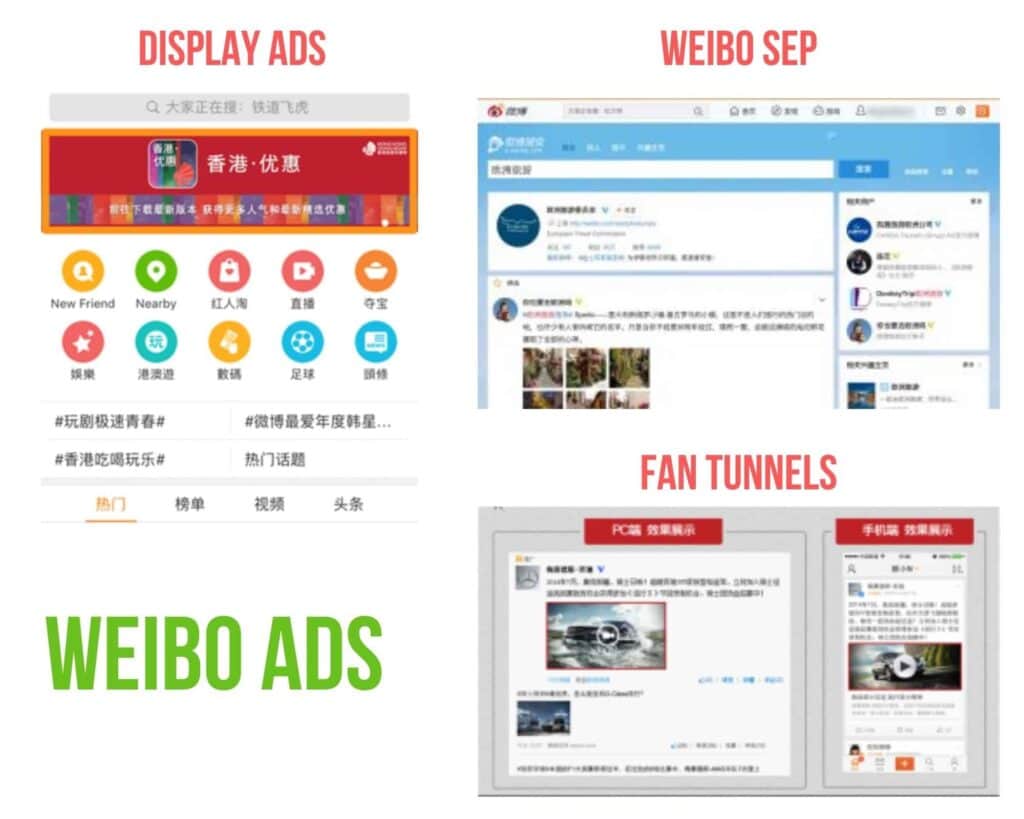
Baidu
Baidu is China’s equivalent of Google and it’s one of the best platforms for advertising, as the majority of searches done in China are done on this search engine. Baidu not only controls the majority of the country’s search engine market but also offers a range of advertising options to help businesses increase their online visibility and drive relevant traffic.
One of the most used and popular options for advertising on Baidu is Baidu PPC ads. Much like Google Ads, Baidu PPC allows businesses to create online advertisements that appear in Baidu’s search results when users search for specific keywords related to their business or industry. Advertisers are then charged a fee each time a user clicks on one of these ads, hence the name ‘Pay-Per-Click‘.
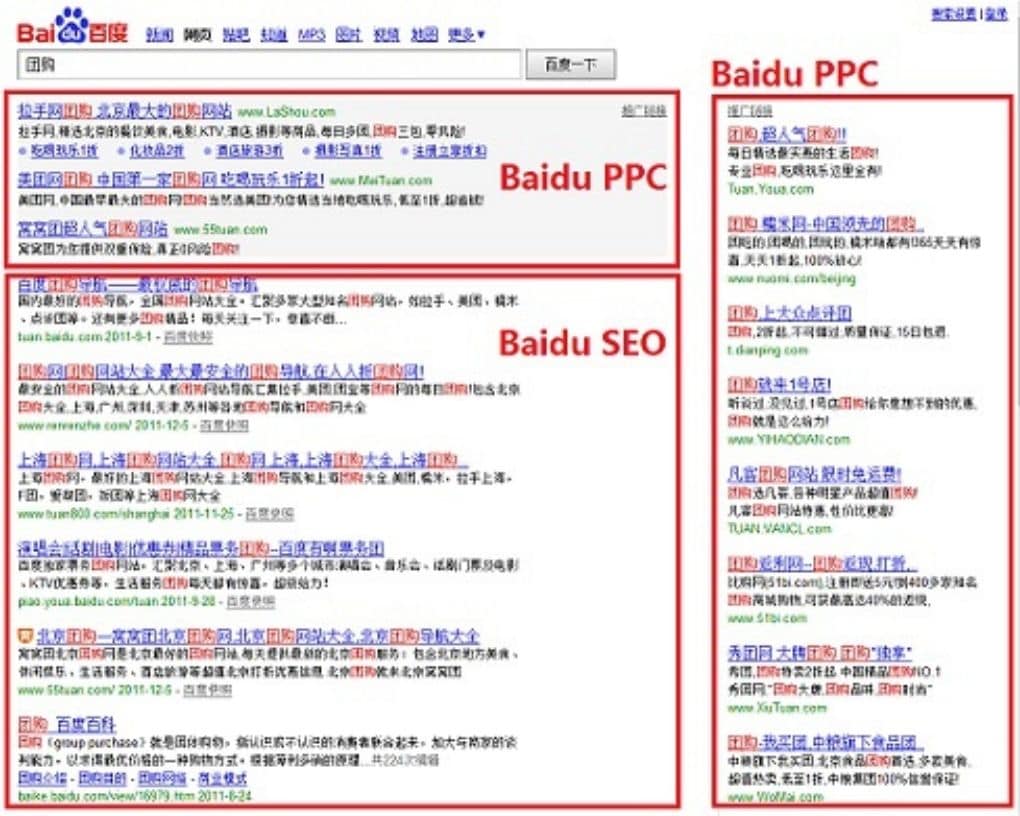
With Baidu dominating the search engine market in China, Baidu PPC ads provide businesses with a powerful tool to improve their online visibility, reach a vast audience, and drive targeted traffic to their websites, thus enhancing their marketing efforts in the Chinese digital landscape.
Additionally, there is Brand Zone, which enables you to create a dedicated branded space within Baidu’s results pages. This feature helps ensure that your brand stands out and captures the attention of potential customers.
Douyin (Chinese TikTok)
Douyin is a short video app owned by the Chinese tech giant ByteDance and has quickly become a popular platform for creating and sharing videos. It boasts an impressive user base of over 800 million monthly active users, making it one of the most successful apps in China.
When it comes to advertising on Douyin, there are two main types of ads that you can utilize. The first is in-feed ads, which appear seamlessly within the For You feed of users as they scroll through content.

These ads allow you to engage with your target audience directly and capture their attention while they’re actively using the app.
Another effective type of advertising opportunity on Douyin is branded hashtag challenges. This involves creating a unique branded hashtag and encouraging users to participate by creating videos related to your brand or campaign.
Xiaohongshu (Little Red Book)
Xiaohongshu is a popular lifestyle-sharing and purchasing decision-making platform that combines community, content, and commerce.
It has become one of the most important social media channels for brand marketing in China because reviews on Xiaohongshu directly impact sales. This unique platform offers opportunities for businesses to engage with Chinese customers and promote their products or services by leveraging its trusted social shopping platform.
With a user demographic consisting of Chinese consumers interested in lifestyle, fashion, beauty, travel, and other related topics – it’s an ideal channel to target Chinese travelers and increase brand visibility among this audience.
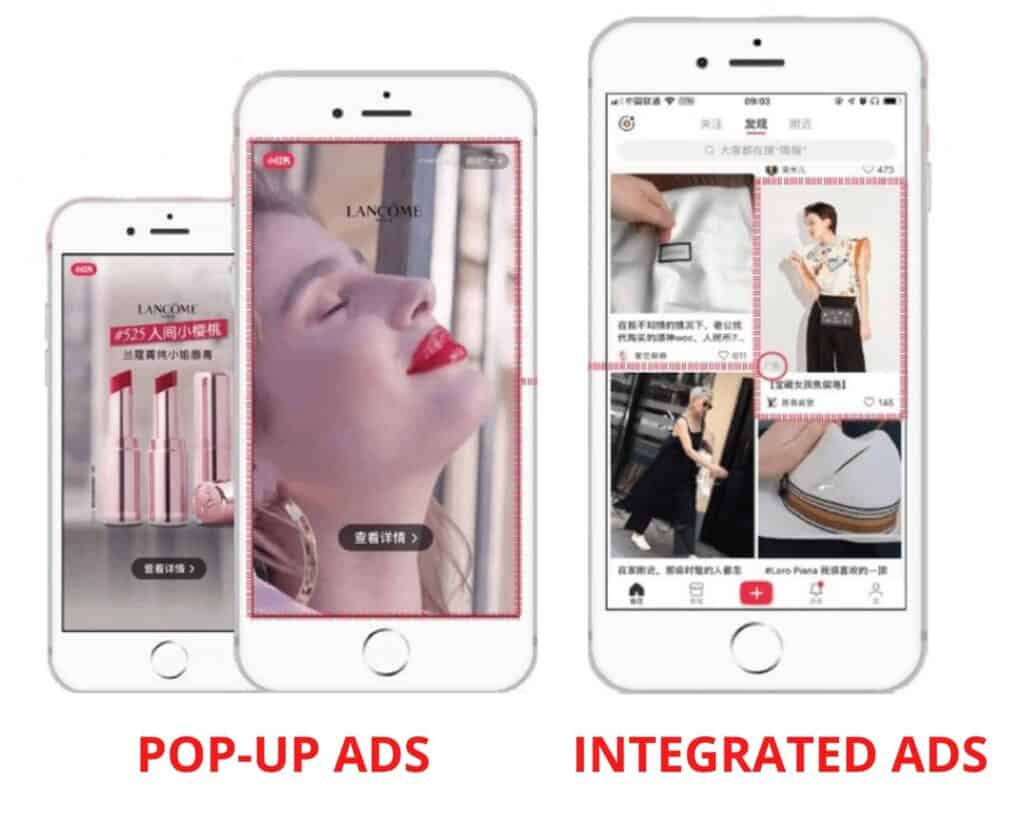
Xiaohongshu offers two forms of paid advertising. The first type, ‘Pop-up‘ ads, appear immediately when users open the Xiaohongshu app, offering direct access to the brand store via a small button at the bottom of the page.
The second type, ‘Integrated ads‘, are seamlessly woven into users’ newsfeeds on both the discovery and following pages, featuring posts from accounts the user follows. A small button labeled “Guanggao” (which translates to “advertising”) located at the bottom of the page on the left of the photo, alerts users of sponsored content.
Together, these advertising methods provide businesses with an opportunity to increase visibility and directly engage with Xiaohongshu’s vast user base.
Choosing the right platform for your business
Choosing the right platform for paid advertising in China market is a strategic decision that should consider several factors:
- Target Audience: The foremost consideration should be your target audience. Different platforms attract different demographics. For instance, if your target audience is younger, platforms like Douyin or Xiaohongshu could be ideal, while for a more professional or older audience, WeChat or Weibo might be more appropriate.
- Business Goals: Align the platform choice with your business goals. If you aim for brand awareness, platforms with a broad reach like Baidu and WeChat are suitable. If your goal is engagement or user-generated content, platforms such as Douyin or Xiaohongshu can be beneficial.
- Digital Ad Spending Budget: Costs can vary significantly across platforms. WeChat and Baidu might require a larger budget than other platforms.
- Content Compatibility: Certain products or services lend themselves better to specific content formats. For example, if your product can be visually appealing or demonstrated through short videos, Douyin could be an ideal platform.
- Platform Specifics: Each platform has its unique features and advertising options. Some platforms are more suitable for certain industries. For example, Xiaohongshu is popular with beauty and fashion brands.
Consulting with one of local digital marketing agencies like Gentlemen Marketing Agency can also provide valuable insights into the dynamics of China’s digital advertising landscape, helping you make an informed decision.
Content Strategies for Tourism Advertising
Creating visually appealing and engaging content, such as stunning photos and captivating videos, is crucial for effective tourism advertising in China.
Appealing visual content (photos, videos)
Visual content, such as photos and videos, plays a crucial role in the success of tourism advertising strategies. In today’s digital age, where attention spans are shorter than ever, captivating visuals are essential for grabbing the audience’s attention and conveying ideas effectively.
Research shows that images and videos have a more significant impact on consumer behavior than text alone. They provide a more immersive and engaging experience, allowing potential tourists to envision themselves experiencing the destination or attraction firsthand.
When it comes to travel marketing, amazing visuals can make all the difference. Eye-catching photographs showcasing stunning landscapes or enticing videos highlighting unique experiences can evoke emotions in viewers and spark their desire to visit a particular destination.
Furthermore, user-generated visual content from fellow travelers has proven to be influential in shaping travel decisions.

Social media platforms like Xiaohongshu and WeChat have become powerful tools for tourism marketing because they allow businesses to showcase their offerings through compelling visuals.
With over 1 billion active users each month on WeChat alone, utilizing visually driven campaigns is an effective way for companies in the tourism industry to reach their target audience.
Live-streaming, a new form of advertising in China
In recent years, live-streaming on Chinese social media platforms has emerged as a powerful tool for the tourism industry to showcase destinations, share travel experiences, and engage with potential tourists in real time. Platforms like Douyin, Kuaishou, and even WeChat have robust live-streaming capabilities that tourism businesses can leverage for advertising.
For instance, a tour operator could live-stream a tour guide’s journey through a scenic route, giving viewers a firsthand experience of what they could enjoy. Hotels could live-stream room tours or showcase on-site amenities. Live Q&A sessions could be used to answer potential tourists’ questions directly.
Additionally, platforms often have options to include links or shopping tags in the live-stream, enabling viewers to book tours, hotel rooms, or buy merchandise directly while watching. The combination of real-time engagement and immediate call to action creates a highly interactive and effective form of advertising, making live-streaming a valuable strategy for the tourism industry in China.
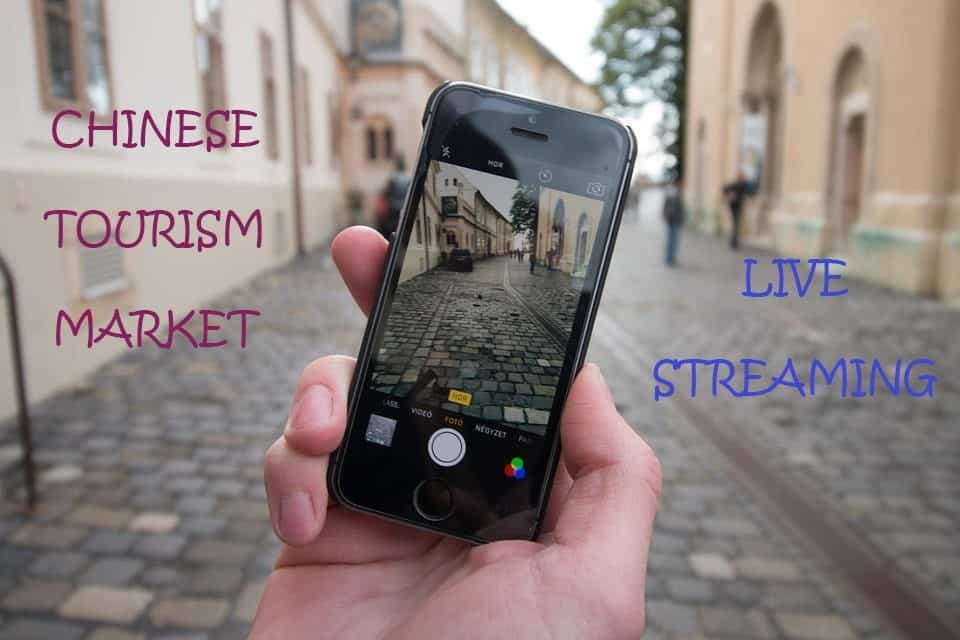
Leveraging Key Opinion Leaders (KOLs) and influencers
Leveraging Key Opinion Leaders (KOLs) and influencers is a crucial strategy for companies in the tourism industry looking to make an impact in China. Influencer marketing, brand advocacy, and content strategy play a significant role in building strong relationships with Chinese consumers.
Chinese travel influencers and KOLs hold immense power when it comes to shaping travel decisions through their personal experiences, recommendations, and captivating images. Collaborating with these influential figures serves as a soft-selling strategy, allowing them to act as communicators between brands and their target audience.
Investing in a comprehensive KOL marketing strategy is vital for international brands aiming to succeed in the Chinese market due to the high level of trust consumers place on influencers’ recommendations.

We Are Your Local Digital Marketing Agency in China!
In conclusion, successful advertising campaigns in China’s tourism industry requires a tailored approach to reach Chinese tourists effectively. By understanding their preferences and leveraging the right platforms such as WeChat, Weibo, Baidu, Douyin, and Xiaohongshu, businesses can connect with this lucrative market.
The unique characteristics and trends of the Chinese market require a tailored approach that considers the preferences and behavior of Chinese consumers. Visual content, native advertising, KOLs/influencers play a vital role in capturing the attention of Chinese travelers.
At Gentlemen Marketing Agency, we are experts in creating and implementing effective advertising strategies in the Chinese tourism market. Let us help your business tap into the potential of this booming industry.

We are highly experienced SEO and high-end copywriting, specializing in creating effective advertising strategies for businesses targeting the Chinese tourism market. With a deep understanding of the changing preferences and behaviors of Chinese travelers, we offer tailored marketing strategies that can help your business thrive in this dynamic industry.
Whether you are looking to tap into the booming domestic tourism market or attract inbound tourists from China, our agency provides insights and services that can drive results. From leveraging popular social media platforms such as WeChat, Weibo, Douyin (TikTok), and Xiaohongshu (Little Red Book), to utilizing native advertising and user-generated content, we will guide you through the unique characteristics of the China advertising market and ensure you make an impact with your digital advertising efforts.

Our team is well-versed in creating visually appealing online advertising content, leveraging native advertising and user-generated content, as well as partnering with Key Opinion Leaders (KOLs) and influencers to enhance your promotional efforts.
Let us help you with your next advertising campaign in China (or maybe the very first one?). We’ve been in China’s advertising industry for more than 10 years now, helping international businesses with search engines and social media advertising. You can be next! Contact us today!
